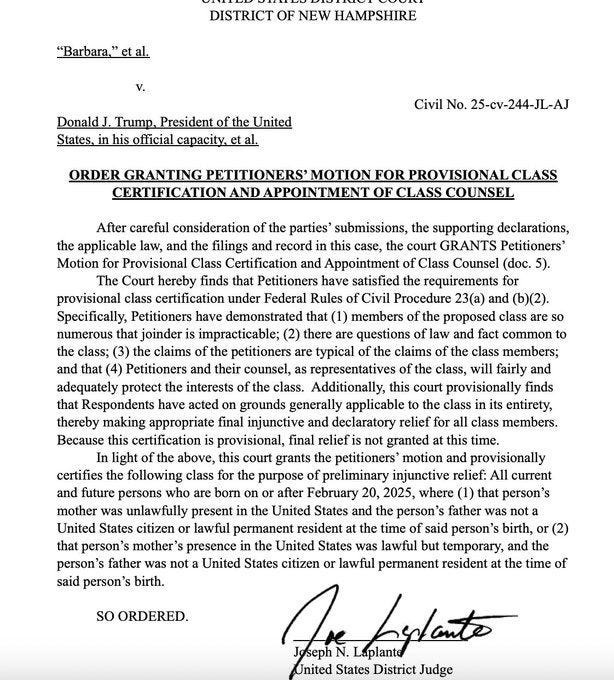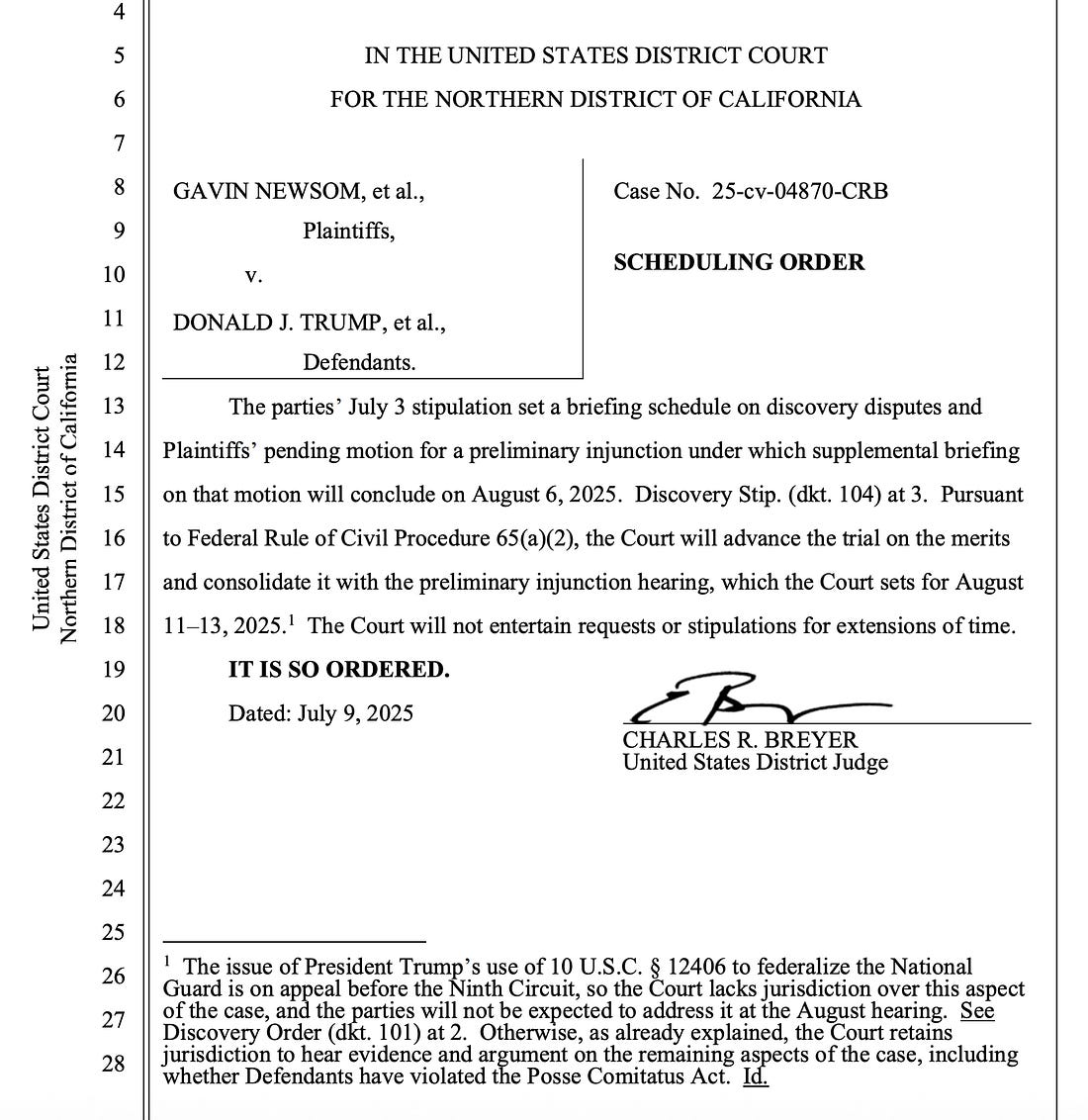|
 |
Today was legal ping-pong. Your head had to zing back and forth to keep up with everything that was happening as we went from courts to the Trump administration’s actions to breaking news from investigative reporting. We’ll go through what it all means, so we can stay on top of the most important developments.
This post runs longer than I try to do with these midweek posts, but it’s unavoidable with everything going on. If you appreciate the time and expertise that goes into these posts, I hope you’ll consider subscribing to Civil Discourse if you don’t already and consider a paid subscription if you are able. It really helps with the resources it takes to produce the newsletter.
Mahmoud Khalil
This was the case that started it. The case that informed a mostly shocked country that this administration thought it was fair game to detain, with the intention of deporting, a lawful green card holder, married to an American citizen who was about to have a baby, for exercising his First Amendment rights. This was the case where Trump used faux outrage over purported anti-Semitism to try to justify his deportation plans. Khalil missed the birth of his first child, but the courts ultimately ordered his release from immigration detention in Louisiana.
Now Khalil has filed a lawsuit claiming he’s entitled to $20 million in damages from the Trump administration. The complaint alleges that he was falsely imprisoned, is being maliciously prosecuted, and had his reputation smeared by claims he was an anti-Semite. The government took issue with his leadership role in campus protests at Columbia.
Khalil says the message is that he won’t be intimidated into silence by the administration and that he would share any settlement in the lawsuit with others targeted for pro-Palestinian speech. But he also said he would take an official apology and changes to the administration’s deportation policies as a settlement offer in the case.
Of course, that’s not going to happen. But Khalil is demonstrating that it’s possible to stand up to this administration and refuse to cave in like others have, ranging from the university that issued his degree to prominent law firms.
Birthright Citizenship
The Supreme Court announced a 30-day pause before the administration could impose its interpretation of birthright citizenship as not applying to a newborn with noncitizen parents, after it decided Casa late last month. A federal judge in New Hampshire did not waste any time certifying the lawsuit before him as a class action and including all affected babies born on or after the attempted effective date of Trump’s proposal in it, and entered, as the Supreme Court said was still allowed, an injunction of behalf of the everyone in the class, effectively a universal injunction. What all the legal talk means is that birthright citizenship is on again and Trump’s effort to cross it out is off, at least for as long as the injunction lasts. But as Judge Joseph LaPlante said, “this decision was not a close call.” Most legal experts agree that Trump can’t write off birthright citizenship. The question is whether the Supreme Court will agree.
Expect the Trump administration to appeal, perhaps attempting, as they previously did in a deportation case, to skip over the court of appeals. Either way, this will likely end up as a matter headed for the Supreme Court’s shadow docket. Whether or not the Court will agree it’s appealable at this stage and decide to hear it is something we’ll watch for carefully. The Court offered the class action/injunction route as a reason that the loss of nationwide injunctions, the decision it delivered in Casa, wasn’t a hardship. Now we’ll see if they meant it.
Revelations from the Erez Reuveni Whistleblower Matter
Last month Trump nominee to the Third Circuit of the United States (and his former criminal defense lawyer) Emil Bove had his confirmation hearing, despite significant concerns, at least from the Democratic side of the aisle, over confirming a lawyer who met Trump’s only criteria for a seat on the federal bench: personal loyalty. Then came the bombshell. Just before the hearing, a recently fired DOJ lawyer named Erez Reuveni filed a whistleblower complaint that accused Bove of directing his subordinates to resist court orders that might be issued and stand in the way of Trump’s efforts to deport people without legal immigration status. Bove was notoriously accused of saying that, if necessary, DOJ would say “F*** you” to the courts to get planes loaded with deportees on their way. When asked about it during the hearing, Bove said, “I don’t recall.”
But it was always clear Reuveni wouldn’t have made the claim if he didn’t have the receipts, and today Senator Dick Durbin, the most senior Democrat on the Senate Judiciary Committee, spilled the tea: emails, texts, and phone records that confirmed that more than one person in the room during the meeting with Bove heard what Reuveni heard, and they discussed it among themselves afterward.
One email from March 16, the day after three planes full of men who would be deposited in CECOT prison in El Salvador took off, demonstrates just how complicit senior leadership at DOJ is in Trump’s abandonment of the rule of law. The number two official in DOJ’s Civil Division wrote to Reuveni and two others. He advised them that Bove gave DHS approval to turn over the men on the planes to El Salvadoran custody after Judge James Boasberg told the government during the hearing that the planes need to turn around and return to the United States. His slim rationale: the planes had already left U.S. airspace before the Judge could get a written order in place. In other words, f*** the courts.
The email Reuveni produced explicitly said that Deputy Attorney General (the number two official in the Department) Todd Blanche was in the loop. Attorney General Pam Bondi seems to have conceded that she was too, tweeting that DOJ’s position was “there was no court order to defy,” although she stuck to the claim that “no one was ever asked to defy a court order” without acknowledging that was because they were given permission to deplane without the topic of the court order surfacing.
Emails confirm that Reuveni repeatedly told his client—the Trump administration—that only people on the planes with final deportation orders could be deplaned and that everyone else must be returned to the United States. “The Judge specifically ordered us,” he wrote, not to remove anyone in the class, which included Venezuelans who were allegedly gang members being deported to custody in El Salvador.
Some of the communications suggest that until Kilmar Abrego Garcia’s situation was profiled by the press, the administration was considering how to get him back. But persons unknown seem to have dug in once the story got into circulation. The administration couldn’t publicly admit it made an error; in fact, doing so in court was what ultimately led to Reuveni’s firing.
What it all adds up to is a Justice Department that lives in the hip pocket of the president and has abandoned its duty of candor to the courts and its constitutional prerogative of ensuring the executive branch follows court orders. It is never about justice and fairness with this administration, just politics and whatever pleases their audience of one. Trump has corrupted the Justice Department, and real people are paying the cost of that. You can access the documents here.
Random Firings at DOJ
New reporting suggests that longtime non-political employees at DOJ, including in the FBI, are suddenly being fired. These are members of the career civil service. The Washington Post is reporting that “a notice signed by Attorney General Pam Bondi that cites the broad powers afforded to the president in the U.S. Constitution” is all they receive. Some FBI employees have been told “they can leave or be demoted or terminated.” Is it a reduction in force or an effort to clear space to replace the cool-headed, competent career folks with Trump loyalists? I doubt it’s the former, since there are mechanisms the Department has already used to offer early outs to more senior people. This is unprecedented and arguably not legal.
Meanwhile at the FBI, The New York Times is reporting that “In interviews and polygraph tests, the F.B.I. has asked senior employees whether they have said anything negative about Mr. Patel.” Apparently, he’s building his own loyalty corps. The facts are far from clear, and it may be that these loyalty hunts are a reaction to stories that have leaked into the press, like one the Times points to involving a very unusual request made by Patel that he be issued a service weapon, like an active FBI agent would be. But it is unpleasantly evocative of Nazi Germany, where children were encouraged to inform on their parents—how else does one know whom to polygraph?
F.B.I. employees owe their loyalty to the Constitution, not the director, and given the power invested in that agency, this has the potential to blow up. Our recent theme has been that where things start is not where they end up. It’s a bad sign that a new director who isn’t even six months in is already resorting to loyalty purging.
Posse Comitatus in L.A.
In California, Judge Charles Breyer has set an August 13 trial date on the issue of whether Trump's deployment of military to Los Angeles violated the Posse Comitatus Act by using the military for civilian law enforcement purposes.

